Floyd Patterson, a sweet-tempered boxer who rose from a troubled boyhood to become the heavyweight champion of the world, died on Thursday at his home in New Paltz, New York. He was 71.
The cause was prostate cancer, Bill O'Hare, a family friend and spokesman, said in a telephone interview. Patterson had also suffered from Alzheimer's disease for about eight years.
In the 1952 Helsinki Olympics, Patterson, with five knockouts in five bouts, won the middleweight gold medal. Then, in a 20-year professional career, he won 55 bouts, lost eight and fought to one draw. His total purses reached US$8 million, a record then.
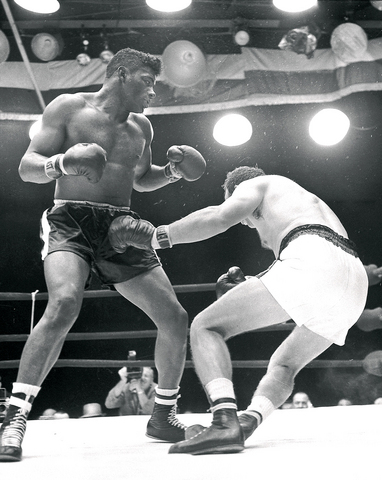
PHOTO: AP
He won the heavyweight title twice, knocking out Archie Moore and Ingemar Johansson and becoming the first fighter to regain the title. He lost it twice, defended it successfully seven times and failed to regain it three other times. He generally weighed little more than 180 pounds, light for a heavyweight, but he made the most of mobility, fast hands and fast reflexes.
He was a good guy in the bad world of boxing. He was mild, sweet, retiring, reclusive, impassive and ascetic. He spoke softly and never lost his boyhood shyness. Constantine "Cus" D'Amato, who died in 1985, trained Patterson throughout his professional career and called him "a kind of a stranger." Red Smith, the New York Times sports columnist, called him "the man of peace who loves to fight."
Patterson acknowledged his sensitivity.
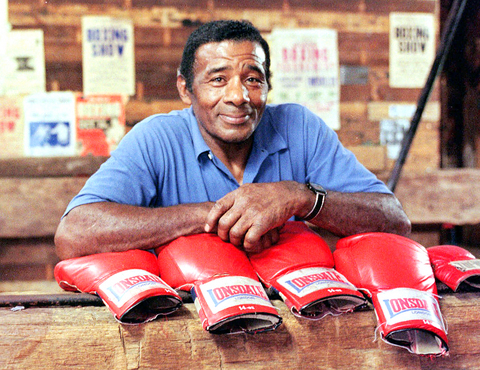
PHOTO: AP
"You can hit me and I won't think much of it," he once said, "but you can say something and hurt me very much."
W.C. Heinz, the boxing columnist, found a fundamental difference between Patterson the fighter and Patterson the person.
"In expressing himself as a fighter," Heinz wrote, "Patterson knows almost complete security. Outside the ring, he knows no such security. A shy, sensitive soul-searcher, he volunteers little. He might be called a conversational counterpuncher. When he does speak out, however, it is with a purity reminiscent of Joe Louis."
Floyd Patterson was born Jan. 4, 1935, in a cabin in Waco, North Carolina, the third eldest of 11 children. His father, Thomas, was a manual laborer and his mother, Annabelle, was a domestic who later worked in a bottling plant until the family moved to the Bedford-Stuyvesant section of Brooklyn.
Above the youngster's bed was a picture of him with two older brothers and an uncle, all boxers. He often told his mother, "I don't like that boy," and once he scratched three large X's over his face in the picture.
He became a frequent truant who fell behind in school. At age 11, he could not read or write. He would not talk, and when someone talked to him, he refused to look the person in the face.
His mother had him committed to Wiltwyck School, a school in upstate New York for emotionally disturbed boys. His new teachers helped him learn to read and encouraged him to take up boxing there, which he did.
A year and a half later, Patterson returned home. He attended Public School 614 for maladjusted children and Alexander Hamilton Vocational High School before quitting after one term to help support his family.
At 14, he started working out at the Gramercy Gym on the Lower East Side of Manhattan, a battered gym owned and run by the iconoclastic D'Amato. In 1950, he also started boxing as an amateur. In 1951, he won the New York Golden Gloves open middleweight title. In 1952, after his Olympic success, he turned professional.
His first professional bout earned him only US$300, but by 1956 he had become a leading heavyweight. When Rocky Marciano retired that year as the undefeated champion, Patterson was matched against Moore, the light-heavyweight champion, for the heavyweight title.
For the fight, on Nov. 30 in Chicago Stadium, Patterson rode to the arena with Sam Taub, the veteran broadcaster and reporter. As Taub recalled, "He sat there gazing out of the window like he was going to the movies."
When they arrived, Patterson put on his trunks, socks, boxing shoes and robe, stretched out on a rubbing table and went to sleep. A few hours later, he stopped Moore in five rounds and at 21 became the youngest heavyweight champion to that point.
Patterson defended the title willingly but uncomfortably. In 1957, he knocked out Pete Rademacher in six rounds in Seattle, and in 1958 he stopped Roy "Cut 'n' Shoot" Harris in 12 rounds in Los Angeles after both had knocked him down.
On June 26, 1959, at Yankee Stadium, Patterson lost the title when Johansson knocked him down seven times before the referee stopped the bout in the third round. But he became the first heavyweight to regain the title when he knocked out Johansson in the fifth round at the Polo Grounds on June 20, 1960.
"It was worth losing the title for this," Patterson said. "This is easily the most gratifying moment of my life. I'm champ again, a real champ this time."
The glory days ended with Patterson's two title fights against Charles "Sonny" Liston. On Sept. 25, 1962, in Chicago, Liston knocked out Patterson in the first round and became the champion. An embarrassed Patterson drove home wearing dark glasses, a mustache and a beard. But he insisted on a return bout because, he said, "If I stopped now, that would be running away."
"I did that when I was a kid," he added. "I've grown out of that."
The return bout came on July 22, 1963, in Las Vegas, and the result was the same -- Liston by a knockout in the first round. Patterson kept fighting after that, but never at his championship level.
In 1965 in Las Vegas, with Patterson hiding a back injury, Muhammad Ali all but tortured him before winning in 12 rounds. In 1970 in Madison Square Garden, Ali opened a seven-stitch cut over Patterson's left eye and beat him in seven rounds.
After Patterson retired in 1972, he became a respected front man for his sport. In 1983, he told a congressional subcommittee: "I would not like to see boxing abolished. I come from a ghetto, and boxing is a way out. It would be pitiful to abolish boxing because you would be taking away the one way out."
From 1977 to 1984 he was a member and from 1995 to 1998 the chairman of the New York State Athletic Commission, which supervised boxing in the state. He led a successful campaign to have the state mandate thumbless gloves and thus reduce eye injuries.
In April 1998, while giving a deposition, his short-term memory failed. He could not remember the names of his two fellow commission members or his secretary or office routines. He resigned the next day.
He was voted into the US Olympic Committee Hall of Fame in 1987 and the International Boxing Hall of Fame in 1991. The public loved him. As Dave Anderson wrote in 1972 in the Times:
"He projects the incongruous image of a gentle gladiator, a martyr persecuted by the demons of his profession. But his mystique also contains a morbid curiosity. Any boxing fan worth his weight in The Ring record books wants to be there for Floyd's last stand. Until then, Floyd Patterson keeps boxing, the windmills of his mind turned by his own breezes."
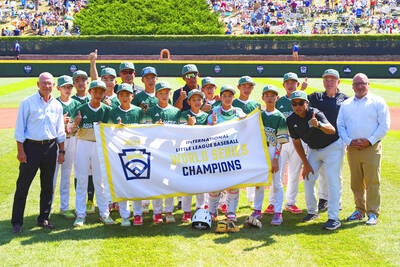
TO THE TOP: After securing the international title on Saturday, Team Taiwan were to face Las Vegas to potentially win their 18th Little League World Series championship A team from Taipei’s Dong Yuan Elementary School won the Little League Baseball World Series’ international title on Saturday by defeating Aruba 1-0 in the annual baseball tournament held in South Williamsport, Pennsylvania. The Taiwan team, competing under the name Chinese Taipei, were after press time last night to face a team from Las Vegas, Nevada, which beat a team from Fairfield, Connecticut, in the US championship 8-2. Taiwan are seeking to win their first Little League Baseball World Series title since 1996. “Really haven’t taken a moment to data dump right now on Taiwan,” Nevada manager T.J. Fescher said. “They’re a
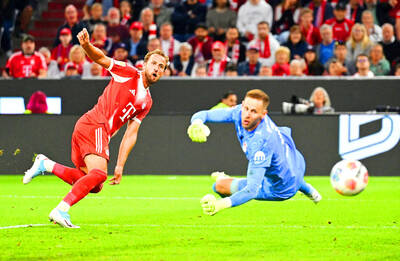
‘CATASTROPHE’: Despite losing several key forwards in the summer transfer window, Bayern were up 3-0 in the first half before Harry Kane scored a hat-trick in the second Harry Kane hit a hat-trick, Michael Olise a double and newcomer Luis Diaz also scored as Bayern Munich made a “statement” against RB Leipzig 6-0 at home in the Bundesliga season opener on Friday. Bayern’s big-money arrivals, all brought in from the Premier League across the past three seasons, were dominant as the Bavarians begun their title defense in style. Olise scored twice in the first half, either side of a Diaz strike. Not to be outdone, Kane scored three goals in the second half — with two assists coming from Diaz, to bring Bayern’s total to 6-0. Kane told the Bundesliga
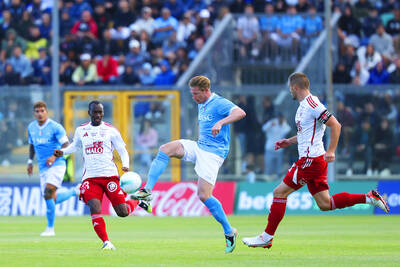
Kevin de Bruyne is to lead SSC Napoli’s Serie A title defense today when he makes his full debut at promoted US Sassuolo, but the champions head into the new season rocked by a long-term injury to star striker Romelu Lukaku. De Bruyne was, alongside aging icon Luka Modric, the big new name to arrive in Italy this summer and fans were hoping his linkup with Belgium teammate Lukaku would push Napoli to success both at home and in their return to the UEFA Champions League. The 34-year-old has suffered from hamstring injuries which caused him to miss significant chunks of the
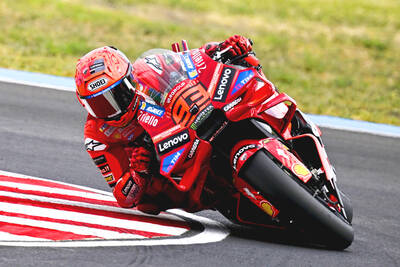
Marc Marquez continued his winning streak as he cruised to victory in the Hungarian GP sprint by two seconds on Saturday night to pad his championship lead. It was a seventh straight Sprint victory for the Spaniard, who has also won the last six longer Sunday grand prix races on his factory Ducati. Fabio Di Giannantonio, an Italian with the VR46 Ducati satellite team was a distant second at Balaton Park, followed by his team-mate and compatriot Franco Morbidelli third. Marquez, a six-time world champion, started the race from pole position. “I felt someone really close on the first corner, from there I